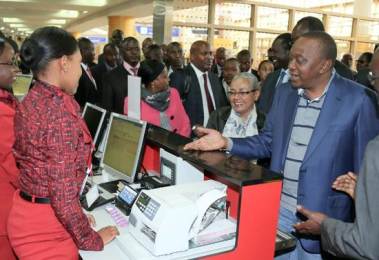Kenyan president steps down as he prepares to front ICC
October 7, 2014 (NAIROBI) – In an unexpected move, Kenyan president Uhuru Kenyatta has stepped down, handing over power to his deputy, William Ruto, in order to face charges brought against him by the International Criminal Court (ICC) as an ordinary citizen.

The decision came after The Hague requested that Kenyatta to appear in court to answer charges leveled against him related to the violence he allegedly masterminded during the 2008 elections which killed thousands of Kenyans.
The transfer of power was conducted in parliament, with Kenyatta arriving to a guard of honour and the national anthem, but leaving the State House without the usual ceremony of a presidential escort.
While addressing the nation, Kenyatta said he would not go to the ICC to attend his status conference as president of Kenya, stripping himself of power temporarily in order to deal with the court as an ordinary citizen.
“I choose not to put the sovereignty of more than 40 million Kenyans on trial, since their democratic will should never be subject to another jurisdiction,” the Daily Nation quoted Kenyatta as saying.
“Therefore, let it not be said that I am attending the Status Conference as the president of the Republic of Kenya. Nothing in my position or my deeds as president warrants my being in court,” he added.
The effect of the handover of power was clearly seen as Kenyatta left the State House office in a private vehicle without his presidential standard and the national flag, with Ruto immediately taking over the presidential vehicles and flag, while his security was also stepped up, as the presidential escort commander was also put in charge of his security.
Ruto becomes the second acting president in Kenya after former president Daniel Arap Moi who acted for 90 days in August 1978 when the founding father of the nation, Jomo Kenyatta, died in his sleep.
Ruto, like former president Moi, comes from the Kalenjin tribe, while Kenyatta, who is the son of the nation’s founder, hails from the largest ethnic group, the Kikuyu.
Observers said Kenyatta’s ICC court attendance was fraught with symbolic and diplomatic difficulty, having in the past mobilised the African Union (AU) to issue a resolution barring the continent’s presidents from submitting to ICC proceedings.
On the other hand, in terms of nationalist symbolism, it would have been politically damaging to drag the nation’s sovereignty through the mud of international criminal proceedings.
He appealed to his colleagues in the AU to understand the basis for his decision to step down.
Kenyatta may reclaim the presidency in the event that he is acquitted by the court.
(ST)
